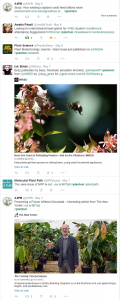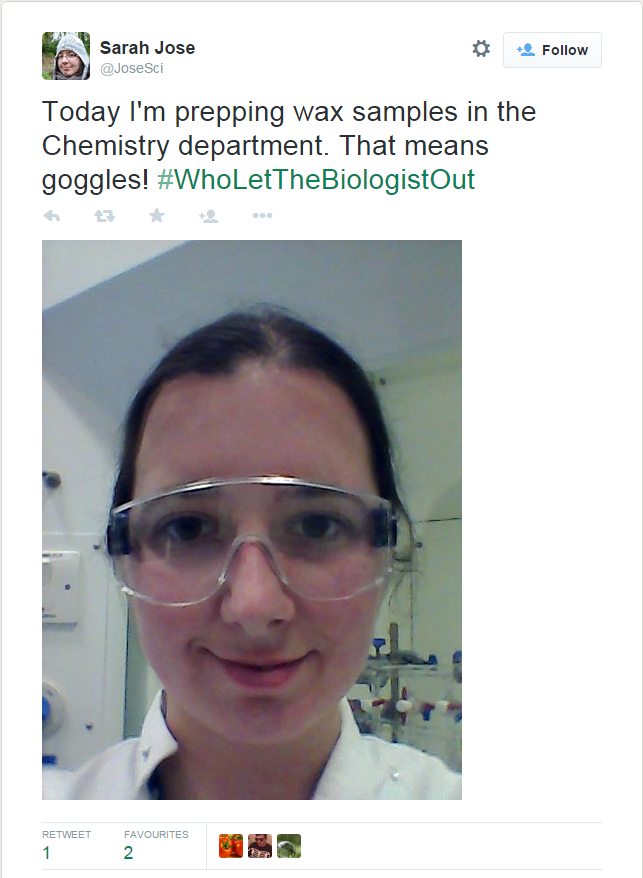 Sarah Jose is third-year postgraduate researcher in plant science. Her research focuses on how plants limit water loss by producing a waterproof coating and pores that can close to prevent water from leaving the leaf. She spends a lot of time looking down the microscope at nail varnish impressions of leaves!
Sarah Jose is third-year postgraduate researcher in plant science. Her research focuses on how plants limit water loss by producing a waterproof coating and pores that can close to prevent water from leaving the leaf. She spends a lot of time looking down the microscope at nail varnish impressions of leaves!
Think Twitter is for keeping up to date with the latest from Taylor Swift and One Direction? Think again! Twitter can be a quality tool for networking, keeping up to date with the latest news in your academic field and more! Read on to see how you can use Twitter to your advantage.

Getting started
I’m going to assume a basic understanding of Twitter here, so if you need an introduction to the topic then check out Twitter’s guide for beginners.
To make the most of Twitter as a PhD student, you’ll need to set up a reasonably professional account. The odd tweet about your cat is fine, but if the majority of your tweets are about your life as a #belieber or how many pints you can drink before you fall into the Floating Harbour then consider creating a new account. Check out this guide for more information.
Why should PhD students use Twitter?
By selecting who you follow, you create a personalised news feed that you can access whenever you like. Don’t feel intimidated if your feed contains more information than you can ever get round to reading. The most important news will be retweeted or reposted several times, and by checking out the main hashtags for your field (e.g. #plantsci for plant biology!) you can keep up to date with the latest trends in just a few minutes a day.
How do you find the most interesting people to follow? Try adding researchers you met at conferences or those whose work overlaps with your own. For publication news, follow some of the important journals in your field, or some of the major organisations, for example if you’re a scientist you might follow the Royal Society (@royalsociety). If you’re just starting out, look at who your colleagues or collaborators are following and choose some of those accounts. I use Twitter as my main source of science news, and it takes far less time than trawling through news sites, blogs and the journal news sites. You will likely also come across funding opportunities that you could apply for to travel to conferences or organise an event.
One of the great things about Twitter is the sense of community. When you start to get involved in online discussions, you’ll realise that even the biggest names in your field are just real people – almost everyone is happy to talk to PhD students and share advice. Just make sure you’re using your community’s hashtag so that others are more likely to see your tweets!
Getting involved in the community can also be great for your career. You’re getting your name out there, and can promote your own research and any publications you might have. There’s some debate about whether or not Twitter mentions can influence the number of citations your paper will receive, but any potential extra exposure can’t be a bad thing. Catching the eye of a potential new employer can’t hurt either!
Top tips for Twitter
You’ve got 140 characters to play with in a tweet. Images take up 23 characters, but are worth including where available as they increase your tweet’s visibility and almost double the likelihood of it being retweeted.
Make sure you keep your content balanced; tweeting about your own work is great, but promoting others is just as valuable and will get you noticed. Be aware, though, that an account full of retweets and no original content will not attract many followers as it looks like you have no interesting ideas of your own.
Don’t just follow thousands of people in the hope of getting reciprocal followers. Those who do this will not be interested in your content, plus your news feed will be overflowing with more information than you could ever hope to read.
What to tweet about?
Need some ideas for tweets? How about:
- Your work. Got any interesting research methods or findings, publications etc.? You could even link to a poster you made or a presentation you’ve given and uploaded to SlideShare, assuming you have your supervisor’s consent!
- You could tweet a day in your life using the hashtag #brisphdlife.
- Publicise an event or article that’s caught your attention, with a comment about why it appeals to you personally. Make sure you use hashtags and @ mentions so that more people will see it!
- Ask a question. If it’s about PhD life, try #phdchat. If you have a question about a particular paper, find out if the author is on Twitter and then ask them directly. It’ll make you stand out and they’ll appreciate the chance to talk about their work.
A note about live tweeting conferences: There has been a lot of debate online about whether or not people should live tweet at conferences. My advice is that tweeting the title of the talk, general comments about the field and previously published results are fine, but DO NOT tweet results that are unpublished. Read this great post for more information.
Don’t overdo the live tweeting anyway. Followers who aren’t interested in the conference will probably unfollow you rather than scrolling through 50 posts about the minutiae of the event.

Want to know more?
Check out the following articles for more information:
- Why you should use Twitter during your PhD
- 10 commandments of Twitter for academics
- A gentle introduction to Twitter for the apprehensive academic


